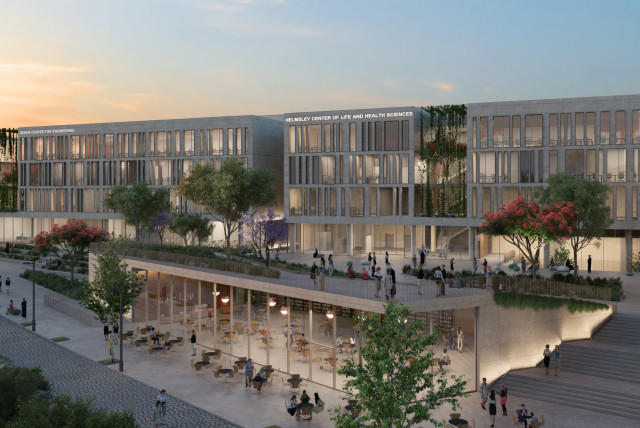This week in Jerusalem: Money time

A weekly round-up of city affairs.
Money time
The 2023 municipal budget was approved earlier this week by the local Finance Committee and stands at NIS 8.42 billion, an increase of NIS 2 billion over 2019. The overall municipal budget for 2023 is NIS 14.4 billion, a record high compared to NIS 12.6 billion in 2022; NIS 12.3 billion in 2021; and NIS 11.2 billion in 2020.
The budget consists of a current and a development budget. Some important sections include an education budget of NIS 2.8 billion (15%); a planning administration budget of approximately NIS 168 million (a 14% increase), which includes a 20% increase for transportation and infrastructure development); and a community administration budget of NIS 1.3 billion (9% increase).
The budget proposal was submitted on Thursday for final approval of the city council.
Growing campus
The municipality has granted the Jerusalem College of Technology (JCT) an excavation permit for its new Tal Campus, the new permanent home for 3,000 religious women students. It will provide increased opportunities to pursue higher education and attain quality employment in engineering, healthcare, and hi-tech.
The campus will span 1.4 hectares and is projected to cost approximately NIS 444 m., of which JCT has raised NIS 260 m. It will also house the Beren Center for Engineering, the Helmsley Center of Life and Health Sciences, the Friedman Center for Business and Management Studies, and the Tessler-Glina Cafeteria. According to Israel’s Central Bureau of Statistics, in 2022 women represented 28% of employees with core technological jobs in the hi-tech workforce. At JCT, over half (53%) of the students studying computer science are women.
This initiative of JCT – home to approximately 5,000 students from religious backgrounds, making it Jerusalem’s second-largest academic institution – aligns with plans to position the capital as a national hub for academic excellence in science and technology.
See you in court
A lawsuit filed by two fans of the Beitar Jerusalem Football Club alleges that the municipality, which owns Teddy Stadium, and the Ariel company, which operates the venue, are negligent in enforcing the no-smoking ban in the stadium. As a result, fans are suffering the effects of passive smoking in the venue.
The two fans who filed the lawsuit have asked the court to ensure that the defendants provide a specific date by which smoking in the stadium will be eradicated. They are also demanding financial compensation for team members for exposure to second-hand smoke, as well as an assurance that the law will not be further violated in this regard.
Not holy poverty
A meeting of the municipal welfare committee revealed the extent of the poverty in the capital, following a request by Elisha Peleg (Likud), who insisted on receiving accurate data. According to Gil Rivosh, the head of the welfare administration at Safra Square, 45% of Jerusalemites defined as “poor” are not being taken care of by this administration.
New reports by the National Insurance Institute and the Jerusalem Institute for Policy Studies reveal the full picture. According to the updated data for the beginning of 2022, there are 125,900 families who fall below the poverty line in Jerusalem, which represent 39% of all families in the capital.
Poverty in the city is particularly common among the ultra-Orthodox and Arab populations. The number of residents in the city who live below the poverty line is 415,700 (42% of all residents), of which 202,400 are children (51% of children).
The Foster-Greer-Thorbecke (FGT) index provides the formula for measuring levels of poverty in society. It shows that the level of poverty in Jerusalem is among the highest in the country, increasing from 27.8% of the poverty line to 28.9%, after the government reduced the scope of aid given during COVID.
The municipality does provide some financial assistance programs for families in dire straits, with 24 Otzma centers operating in the city. These centers provide individual and group assistance to approximately 4,000 local families, with assistance given in areas of employment, family finance and budgeting, integration into the community, and the exercise of rights.
The purpose of the project is to provide tools for families to get out of the cycle of poverty while meeting their various needs. In addition, about 400 families who take part in the family programs receive wide-ranging help and assistance, which includes the personal services of a lawyer where necessary.
The ongoing support focuses on financial management and budgeting, dealing with debts and reaching settlements, mediation with the relevant services in the community, and more.
In addition, assistance is provided to 20,000 residents every year by the municipal employment authority. They provide professional training, introductions to employers, job fairs, and more. The services are provided by eight employment centers located throughout the city.
Bridge over troubled road
The fight over the railway park and the Berech road has been brought before the Knesset by the Hitorerut movement. The Interior Committee has asked the municipality to re-examine the plan and see if it is possible to reduce the damage to the Messila Park route.
Last week, a group of residents opposed to the plans for the road and the bridge went to the Knesset. MKs Tsega Melaku and Orit Farkash-Hacohen, who initiated the debate, called for reconsideration of the construction of the bridge and the road, which they claim would harm the track park route.
A neighborhood resident claimed the municipality is disregarding the needs of Katamonim residents in favor of the new neighborhood of Talpiot, due to be completed in 10 years.
Yossi Saidov, chairman of the Gonenim community, added that Jerusalem has too many private vehicles and prioritizes drivers to the detriment of other residents.
At the conclusion of the discussion, the Interior Committee called on the Planning Administration, the Jerusalem Municipality, and the Ministry of Transportation to examine the plan and see how it might be possible to reduce the damage of the planned road on the green spaces of the city, while ensuring the safety of pedestrians and residents in the area.
In addition, the committee called for the public to get involved and have their say in the matter.
Get out
Police broke into the home of the Sov Laban family on Tuesday morning and evacuated the family members, who had lived in the Old City’s Muslim Quarter for 70 years. The house was recognized by the court as being a Jewish-owned property before 1948 and had been sold to a Jewish endowment. The Sov Labans’ evacuation is the end of a long struggle that has paved the way for a Jewish family to move in. The family had rented the apartment from the Jordanian king in the 1950s after they had to move out of the western side of Jerusalem and leave their property behind. In 2001 the mother, Nora Sov Laban, was adjudicated the right for the family to continue renting the property for three generations, as long as she stayed in the house; but in 2016 she had to leave home for medical reasons, and that absence was used by the Hekdesh association (recognized by the court as the legal owner) to claim that Nora lost the right to continue renting the house. The family members were recently informed that preparations had begun for forced evictions from the property, at their expense, which occurred earlier this week, followed by demonstrations at the Jaffa Gate, which ended with 12 arrested by police.
Ball in the basket
Alissa Baron, Israeli national basketball team player and champion for the past two years, signed this week with Hapoel Lev Jerusalem, the newcomer to the Premier League. The 30-year-old Baron led Elitzur Ramla to the national championship in the 21/22 season and was chosen as the outstanding player of the final series, joining the Israeli National Team in the last season, and becoming its leading player. Currently, Baron is attempting to qualify for the Olympic Games. This is Hapoel Lev Jerusalem’s second signing, after the team, last week, onboarded 24-year-old Shir Tirosh, a National League player for the past three years. Hapoel Lev Jerusalem is the largest women’s basketball club in the Jerusalem area. It is also the only club in Israel that has a women’s team in the Super League and a girls’ basketball academy that operates in Jerusalem. The club was founded with the aim of giving women, regardless of religion or affiliation, empowerment and challenge to excellence through sports. ❖
Jerusalem Post Store
`; document.getElementById("linkPremium").innerHTML = cont; var divWithLink = document.getElementById("premium-link"); if (divWithLink !== null && divWithLink !== 'undefined') { divWithLink.style.border = "solid 1px #cb0f3e"; divWithLink.style.textAlign = "center"; divWithLink.style.marginBottom = "15px"; divWithLink.style.marginTop = "15px"; divWithLink.style.width = "100%"; divWithLink.style.backgroundColor = "#122952"; divWithLink.style.color = "#ffffff"; divWithLink.style.lineHeight = "1.5"; } } (function (v, i) { });

